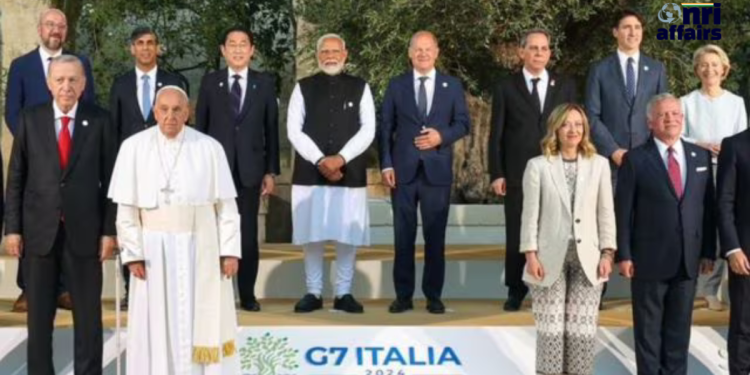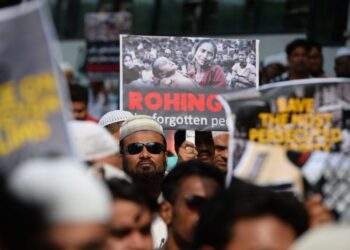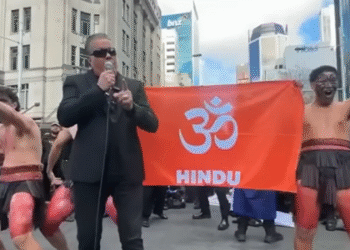In a significant move aimed at bolstering global trade and connectivity, the G7 Summit has reaffirmed its commitment to promoting the India-Middle East-Europe Economic Corridor. This initiative aims to enhance economic cooperation and infrastructure development across the regions involved.
The Group of Seven (G7) industrialized nations have pledged to support tangible infrastructure projects like the India-Middle East-Europe Economic Corridor (IMEC) in the Communique issued after the three-day G7 Summit, which was attended by Prime Minister Narendra Modi.
“We will further promote concrete G7 PGII (Partnership for Global Infrastructure and Investment) initiatives, flagship projects, and complementary efforts to develop transformative economic corridors through quality infrastructure and investment. This includes enhancing coordination and financing for corridors such as the Lobito Corridor, Luzon Corridor, Middle Corridor, and the India-Middle East-Europe Economic Corridor. These efforts also build upon initiatives like the EU Global Gateway, the Great Green Wall Initiative, and Italy’s Mattei Plan for Africa,” stated the communique.
Prime Minister Modi participated in the G7 Summit at the invitation of Italian Prime Minister Giorgia Meloni, who hosted the event.
Leaders at the G7 Summit have endorsed a comprehensive plan to advance the India-Middle East-Europe Economic Corridor, recognizing its potential to foster economic growth and stability. This ambitious corridor is envisioned as a pivotal route for trade and investment between India, the Middle East, and Europe, spanning critical sectors such as energy, transportation, and digital infrastructure.
During the G7 Summit, leaders reiterated their commitment to a free and open Indo-Pacific region governed by international law.
“We reaffirm our commitment to a free and open Indo-Pacific region, underpinned by the rule of law, inclusive prosperity, and security. This framework is based on principles of sovereignty, territorial integrity, peaceful dispute resolution, fundamental freedoms, and human rights,” stated the White House in a released statement.
The summit’s declaration emphasized that the G7’s intent was not to undermine China or impede its economic progress. Instead, the group pledged to take measures to safeguard businesses from unfair practices, promote fair competition, and address ongoing issues to ensure a level playing field.
The initiative seeks to strengthen existing trade links and establish new pathways for economic collaboration, leveraging the strategic geographical positioning of the participating regions. By enhancing connectivity and reducing trade barriers, the corridor aims to facilitate smoother movement of goods, services, and investments, thereby promoting regional integration and prosperity.
“We aim for constructive and stable relations with China, acknowledging the importance of direct and honest dialogue to address concerns and manage differences. Each of us acts in our national interest. Recognizing China’s significant global role, cooperation is essential to tackle shared challenges. We remain committed to engaging in areas where our interests align,” the statement highlighted.
The statement continued, urging China to intensify efforts in promoting international peace and security. It called for collaboration in addressing climate change, biodiversity loss, and pollution challenges, as well as combating illicit synthetic drug trafficking. Additionally, it emphasized the need for cooperation to ensure global economic stability, strengthen global health security, and support the sustainable debt management and financing requirements of vulnerable nations.
The summit convened with the participation of the seven member countries—US, UK, Canada, Germany, Italy, Japan, and France—alongside the European Union. Italian Prime Minister Giorgia Meloni extended an invitation to India as an ‘Outreach Country’ at the G7 summit, which took place in Italy’s Apulia region from July 13-15.
During the summit, Prime Minister Modi addressed the G7 Outreach Session focusing on AI, energy, Africa, and the Mediterranean, emphasizing the transformative impact of technology on human advancement.
Also Read: Future Trends in NRI Relations: A Forward Look
On the sidelines of the G7 Summit, PM Modi engaged in bilateral meetings with French President Emmanuel Macron, UK PM Rishi Sunak, Japanese PM Fumio Kishida, Italian PM Giorgia Meloni, and Ukraine President Volodymyr Zelenskyy. Additionally, he interacted with US President Joe Biden, German Chancellor Olaf Scholz, Canadian PM Justin Trudeau, and Pope Francis.











